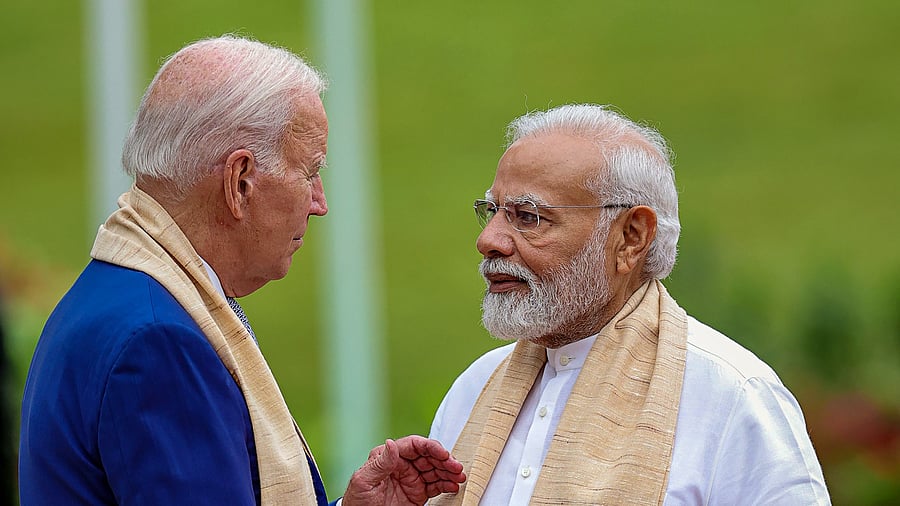
Prime Minister Narendra Modi with US President Joe Biden at Mahatma Gandhi's memorial Rajghat on the final day of the G20 Summit, in New Delhi, Sunday, Sept. 10, 2023.
Credit: PTI Photo
Two days after he had a bilateral meeting with Prime Minister Narendra Modi, United States President Joe Biden said that he had stressed the importance of respecting human rights and freedom of the press during his talks with his host in India.
“And, as I always do, I raised (with Modi) the importance of respecting human rights and the vital role that civil society and a free press have in building a strong and prosperous country,” Biden told journalists in Hanoi, referring to his talks with the prime minister during his recent visit to New Delhi.
Biden was on a tour to New Delhi from Friday to Sunday, primarily to attend the G20 summit, which was hosted by Modi at ‘Bharat Mandapam’ in the national capital during the weekend. He drove to the prime minister’s residence at 7 Lok Kalyan Marg soon after arriving in New Delhi for a bilateral meeting. Modi also hosted a private dinner for Biden.
The US president attended the first day of the 18th G20 summit but skipped the sessions on the second day to fly from New Delhi to Hanoi for a visit to Vietnam.
The Biden administration has been conveying to the Modi government in New Delhi its concerns over the perception in the US about the backsliding of democracy in India.
The US State Department’s annual reports on religious freedom have been referring to the alleged incidents of atrocities and violence against minority communities in India.
Biden’s Secretary of State Antony Blinken had last year said that the US was “monitoring some recent concerning developments in India, including a rise in human rights abuses by some government, police, and prison officials”. He had followed it up on June 2 that year stating that India, the world’s largest democracy and home to a great diversity of faiths, had seen rising attacks on people and places of worship.
Modi’s spectacular state visit to Washington DC and his meetings with Biden on June 22 had come under a bit of a shadow as 75 Democrat members of the American Congress wrote to the US president requesting him to convey concerns over reports of growing religious intolerance, shrinking of political space, curbs on freedom of the press and erosion of human rights in India.
At least six US lawmakers had also boycotted the prime minister’s address to a joint sitting of the US Congress – alleging repression of religious minorities during his tenure at the top office in New Delhi.
Even as Biden hosted Modi at the White House in Washington DC, former US President Barack Obama told CNN that if the rights of the minority Muslims in India were not protected, the country might someday start to pull apart. He had even suggested that the issue of protection of minority Muslims in Hindu-majority India was worth mentioning if the president of the US had a meeting with the prime minister of India.
Modi did not directly respond to Obama, but the former US president did draw flak from the ruling BJP’s leaders in India, including heavyweights like union Finance Minister Nirmala Sitharaman, Defence Minister Rajnath Singh and Assam Chief Minister Himanta Biswa Sharma.
A Wall Street Journal scribe, Sabrina Siddiqui, was also at the receiving end of a campaign on social media platforms as she had asked a question to the prime minister during his joint press conference with the US president at the White House on June 22 about the state of democracy and religious freedom in India. The online harassment of the journalist had been criticised by the White House.
Though several journalists accompanied the US president from Washington DC aboard Air Force One to cover his recent tour to New Delhi and Hanoi, they were not allowed to be present during his meeting with Modi.
When the US president meets any other world leader in Washington DC or anywhere else, they generally jointly address the journalists at the beginning of the talks and then again jointly interact with them after the meeting.
As it was not going to happen for the Modi-Biden talks in New Delhi, the journalists asked for the reasons during an interaction with Biden’s National Security Advisor Jake Sullivan aboard Air Force One even before the US president landed in the national capital of India. Sullivan replied that it was not a usual bilateral engagement and since Modi would host Biden at his residence, Washington DC had to accept the protocol set by New Delhi.
